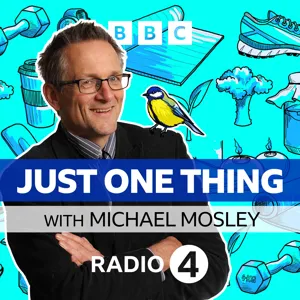Podcast Summary
Explore the right resources for optimal results: For important decisions like shopping, hiring, or self-care, utilize Blue Nile for custom rings, LinkedIn for hiring, and simple actions like walking with your pet for health benefits.
When it comes to making important decisions, such as buying a unique engagement ring or hiring for your business, it's essential to look in the right place. For rings, visit Blue Nile's website to design a custom piece with ease and convenience. Use promo code "listen" for a discount. For hiring, LinkedIn is the go-to platform to find professionals who might not be actively searching for new opportunities. As for improving health, simple actions like taking a rainy-day walk with your pet can boost your mood and immune system. So, whether it's shopping, hiring, or self-care, make sure to explore the right resources for optimal results.
Embrace the Rain: Unexpected Benefits: Rain releases mood-boosting compounds, cleanses the air, and can improve focus. Try going outside during rainy days for unexpected benefits.
Despite the common perception, rainy days are not something to be avoided, but rather embraced for their numerous benefits. In the UK, where it rains for approximately 159 days a year, new research suggests that rain can positively impact our brain and body. It releases special compounds that can improve mood and focus, and cleanses the air of pollutants, providing fresher air for our lungs. So, next time it rains, instead of staying indoors, consider going outside or going for a walk shortly after the rain has stopped. This simple shift in perspective could lead to unexpected benefits. During the conversation, a PhD student named Dennis shared that he spends most of his time at home due to remote work and usually only goes outside when the weather is nice. When asked to try going out during rainy days, he expressed willingness to give it a try. The challenge for Dennis, and for many of us, is to overcome the mental barrier of associating rain with negativity and instead, see it as an opportunity to experience these hidden benefits. So, let's embrace the rain and enjoy the freshness it brings, both to our minds and to the world around us.
Walking in the rain improves air quality and boosts mood: Rain improves air quality by reducing harmful particles, releases mood-boosting geosmin, and adds negative ions to boost immune response and improve mood
Going for a walk on a rainy day can have numerous health benefits. According to research, rain improves air quality by reducing harmful fine particles and releasing the mood-boosting chemical geosmin. Geosmin, which has a pleasant earthy smell, can increase serotonin levels, promote relaxation, and decrease inflammation. Additionally, rain ionizes the air, adding negative ions that can improve immune response, boost mood, and reduce depressive symptoms. So, the next time it rains, consider going for a walk and enjoying the benefits that come with it.
The Unpredictable Benefits of Negative Ions: Discovering mood-lifting benefits of negative ions through unexpected clinical trial results
Exposure to negative ions, which can be created naturally through intense rainfall or artificially through devices like air purifiers, can have mood-lifting benefits. This was discovered during a clinical trial where researchers were searching for a placebo control for light therapy used to treat winter depression. They assigned randomized groups to bright light therapy, high density negative air ion therapy, and low density negative air ion therapy, believing that both ionization methods would be placebos. However, the subjects who received high density ions gradually improved over about three weeks, indicating that it was not just a placebo effect. This discovery highlights the unpredictable nature of scientific research and the potential benefits of negative ions for improving mood.
Improving mood with negative air ions: Negative air ions from air purifiers or natural sources like rain improve mood in various types of depression, comparable to bright light or antidepressants, without side effects. The mechanism might be due to blood hyperoxygenation.
Negative air ions, which can be produced by specialized air purifiers or obtained naturally after a heavy rainfall, have been shown to effectively improve mood in various types of depression, from seasonal affective disorder to chronic depression. The improvement is comparable to that of bright light or standard antidepressants, but without the side effects. The mechanism behind this effect is not yet fully understood, but it's hypothesized that the hyperoxygenation of the blood caused by inhaling negative ions might be responsible for the mood lift. The dose of negative ions obtained from a high-density air ionizer or from being outside shortly after a rainstorm is similar, making the latter a natural and cost-effective mood booster.
Going for a walk in the rain: Mood booster and focus enhancer: Walking in the rain can improve mood, boost energy, increase focus, and potentially strengthen the immune system
Going out for a walk in the rain can have numerous benefits for your mood, productivity, focus, and even your immune system. The rain itself produces negative ions that can improve your mood and boost your energy levels. Additionally, the rainy weather can make you more present and focused, allowing you to make the most of the day. So, the next time it rains, consider going for a walk and taking in the fresh, clean air. It's a simple addition to your daily routine that could have a positive impact on both your physical and mental wellbeing. And if you're looking for more interesting and informative content, be sure to check out the Infinite Monkey Cage podcast on BBC Sounds, where they discuss various topics from science to comedy.
Delivering Heart and Quality in Their Respective Industries: 1800flowers.com brings joy through high-quality gifts for special moments, while Quinn offers ethically-made travel essentials at affordable prices.
Both 1800flowers.com and Quinn bring heart and quality to their respective industries. While 1800flowers.com is known for helping customers celebrate life's special moments with love-filled gifts, Quinn offers jet-setting essentials at affordable prices while ensuring ethical manufacturing practices. For 1800flowers.com, it's not just about birthdays, anniversaries, or "just because" gifts. They put their hearts into every aspect of their business, from their farmers and bakers to their florists and makers. This dedication to delivering smiles is evident in their commitment to high-quality products and customer satisfaction. Quinn, on the other hand, provides travel essentials that are not only stylish and functional but also ethically produced. With European linen, premium luggage, and Italian leather bags, Quinn offers a more luxurious travel experience at a fraction of the cost of similar brands. Their commitment to safe and ethical manufacturing practices ensures that customers can feel good about their purchases, both in terms of quality and ethical considerations. In summary, both 1800flowers.com and Quinn prioritize heart and quality in their industries, delivering love-filled gifts and essential travel items that cater to their customers' needs and values.






